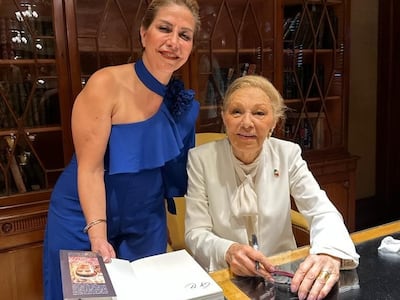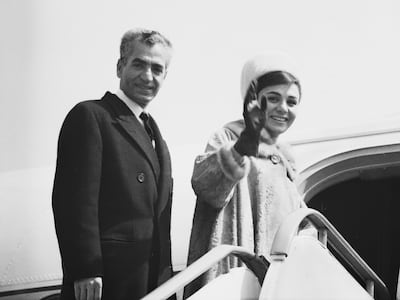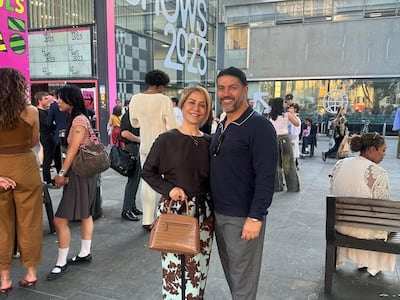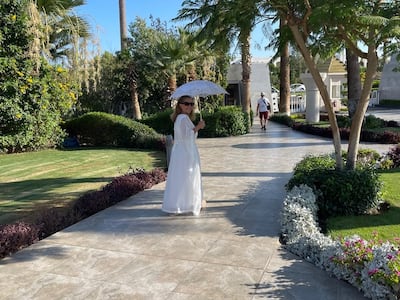The husband of a British-Iranian woman detained in Iran for meeting Farah Pahlavi, the widow of the last shah, fears for his wife's health.
Nasrin Rooshan has been jailed for three years after meeting Ms Pahlavi, 85, and taking part in the Woman, Life, Freedom protests against the Iranian government in London.
London resident Ms Rooshan, 60, was arrested at an airport in Iran in November after a visit to a terminally ill aunt, her husband Arash Asiabi told The National.
She has developed a heart condition while in prison, and Mr Asiabi fears she will not get the medical treatment she needs.
“Recently, they notified us that one of her valves is failing,” he said. “It’s hard enough to get to a GP in Iran – in prison it’s even worse.”
Ms Rooshan also suffers from knee pain and was scheduled for an operation in the UK.
She was taken to hospital in Iran and given an injection a couple of weeks ago after “lots of pressure” from her family, who supplied the medication.

London taxi driver Mr Asiabi decided to speak out on Ms Rooshan’s behalf this week after months of silence around her detention.
He said his wife was subjected to weeks of “white torture” – a form of solitary confinement common in Iranian prisons.
Annual commemoration
Every year, Ms Pahlavi hosts a public event marking the death of her husband, Shah Reza Pahlavi in Cairo, where he is buried.
A patron of the arts and founder of the Shiraz Arts Festival in the ruins of Persepolis, the then Queen Farah fled Iran with her husband after his US-backed regime was overthrown by the Islamic Revolution in 1979.

Ms Rooshan attended the event for the first time in November with her cousin, Sara Tabrizi, who was also detained.
During questioning by the Iranian authorities, Ms Rooshan was shown social media posts she had written promoting the rallies in London. She was also shown photographs of her with Ms Pahlavi in Egypt in 2023.
Mr Asiabi said they had not posted the photos of the event in Egypt online, and he did not know how the Iranian authorities had acquired them.
Ms Rooshan’s home in Tehran was raided by the police. “They destroyed the house. They were looking for something, we don’t know what,” he said.

After seven weeks of questioning and solitary confinement, she was transferred to Evin Prison in Tehran.
Her cousin Ms Tabrizi died of unknown causes at home in March, three days after her release. She was 21 years old.
“Nobody knows how she died. Under interrogation she experienced so much stress and anxiety,” Mr Asiabi said adding that Ms Tabrizi had been planning to travel to the UK before her death.
“She was the same age as my daughter.”
Ms Rooshan was initially given a four-year sentence, which she accepted. This was cut to three years. A couple of days after her cousin’s death, Ms Rooshan's relatives received a letter saying her sentence had been reduced to 13 months.
At that point, Mr Asiabi and his family decided not speak out against her arrest, in the hope that silence would help with the reduced sentence.
“We stayed quiet. We played the game they wanted us to play,” he said.
But when Mrs Rooshan’s lawyers request for a pardon was denied, they were also informed that the notice of the reduced sentence had been an error, Mr Asiabi said.
Imploring the UK for help

Now he has changed tack. He is seeking legal advice in the UK before contacting his MP and the UK Foreign Secretary David Cameron.
Although Mr Asiabi does not expect this effort will lead to the release of his wife, it could help to ensure she receives better care in prison.
“It could reduce the pressure [they put on my wife] and reduce the harm,” he said.
The Iranian government, he said, remains indifferent to international condemnation over its foreign prisoners, many of whom are dual nationals of Iranian origin.
“The government of Iran loves to take hostages – they don’t care,” he said. “This government just wants to keep people quiet.”

He is fearful of the repercussions of speaking out, recalling how former prime minister Boris Johnson botched comments about another British-Iranian, Nazanin Zaghari-Ratcliffe, coinciding with her prolonged prison sentence in Iran.
“In our experience, with so many different people, you can see how things can go wrong,” Mr Asiabi said.
Last year, the UK government was criticised for its handling of the imprisonment of Morad Tahbaz, a dual American and British citizen whose release was won by the US when a $6 billion deal with Tehran was struck.
Ms Rooshan had been a citizen of the UK for 25 years. “My expectation is that like any decent government, the [UK] looks after its citizens. My expectations are no different to any other citizen,” Mr Asiabi said.
Living in agony

Every day since Ms Rooshan’s detention began had been “agony”, Mr Asiabi said.
He becomes tearful when discussing his daughter, a university student in London who needs therapy to cope with the stress of her mother's imprisonment.
“It’s very hard for me to see her like this,” he said.
Ms Rooshan is allowed to call her family for about 15 minutes five days a week, and this is organised in a conference call through a relative in Tehran.
“She cannot talk about everything over the phone; sometimes we ask a question and the phone line is cut off,” Mr Asiabi said.
He feared she may be under duress to conceal details of her day-to-day reality.
“All we hear is ‘I’m fine, everything is OK, no one has raped me, this doesn’t happen here any more,’” he said. “But what is happening behind the curtain, we have no idea.”
He hopes that speaking out will also send a message to other Iranians overseas, that even participating in protests “thousands of miles away” could mean danger if they go back to Iran.


